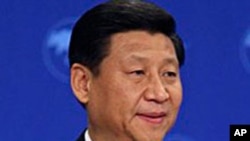Xi Jinping has been appointed as vice chairman of China's Central Military Commission.
Christopher McNally, political economist at the East-West Center in Honolulu, Hawaii says that appointment means far more than simply being named to a new position.
What it means says McNally, is that the Chinese succession plans that have been in place for the past decade or so are now being implemented.
That, says McNally, means that Xi Jinping should, in late 2010 become the party’s secretary and then finally become the president, and then after another few years, become the chair of the Central Military Commission itself.
What changes are we likely to see when Xi becomes China’s leader?
There is unlikely to be a lot of change. This a very smooth transition, a long transition, gradual in a sense that Xi Jinping will only gradually gain full power. It will take quite some time, probably until the end of what will be 2014 or even later for Hu Jintao to step down from his position in the Central Military Commission. So he will remain chair beyond when Xi Jinping becomes party secretary and president meaning that the present politics will continue to frame what is happening in China.
What issues now face China?
For now, the main issue is the next five year plan and to which extent China can rebalance its own economy, meaning moving it from export and investment dependent into consumption oriented. And if the Chinese are successful doing that, it will change the socio-political environment over time because you’ll have a much larger urban themed shift, more social welfare. The state will actually become much more involved with people’s lives than it has been until now, and that in turn probably will raise social demands for better governance. So we’ll see changes over the coming years but not necessarily dependent on Xi Jinping, his character and his background. As I said, this is a collective leadership. The consensus now is being formed about what they’re going to do in the next five years, and it’s likely that will be implemented.
Which way do you see China going as far as its position on the world stage, especially as far as its military is concerned?
That is a more troublesome aspect. Basically, as China increases its comprehensive national power, especially its economic power but also its financial power, China will become a lot more influential. And a lot of the ways China sees the world are quite different from the western order, and therefore conflict or at least misunderstandings, miscommunications and increasing friction is very likely in the next decade.




